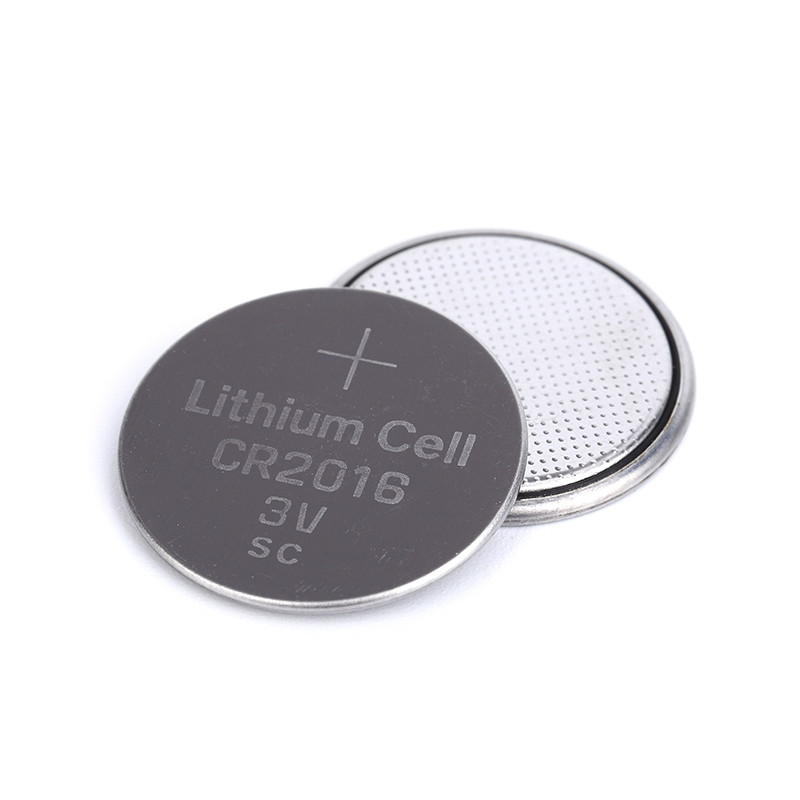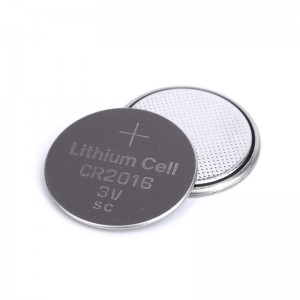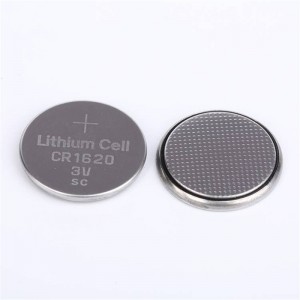3V Lithium CR2032 CR2025 CR2016 Button Cell Battery
Scope
This specification is applicable to Coin Type Lithium-Manganese Dioxide Battery CR2032
|
Battery Type |
CR2032 |
|
Nominal Voltage |
3.0V |
|
Nominal Capacity |
210mAh (discharged continuously at 20±2℃ under15kÙ load to 2.0V end-voltage) |
|
Outer Dimensions |
outer dimensions shall be as shown in Fig1. |
|
Weight |
3.0grams (approx) |
|
Terminals |
positive can(noted“+”) negative cap |
|
Operating Temperature Range |
-20℃ ~ 60℃ |
|
Electrochemistry System |
Anode Manganese Dioxide |
|
Cathode Lithium |
|
|
Electrolyte Lithium-salt organic electrolyte |
|
|
Environmental Substances |
All substances used in batteries be according to the RoHS instruction. |
Battery performance.
Appearance:
Appearance of batteries shall be neatness, singed clarity, and have no remarkable deformation, dent, stain, leakage and so on defections.
Dimensions:
Dimensions of batteries when tested in accordance with Subparagraph 4.3(2) shall be as shown in Fig1.
Characteristics
(1) Open-Circuit Voltage:
Open-circuit voltage of batteries when tested in accordance with Subparagraph 4.3(3) shall meet the requirements set forth in [Table 1].
(2) Closed-Circuit Voltage:
Closed-circuit voltage of batteries when tested in accordance with Subparagraph 4.3(4) shall meet the requirements set forth in [Table 1].
| Test Items | Temperature | Initial * | Storage* | Test Conditions |
| Open-Circuit
Voltage |
20±2℃ | 3.0V To 3.4V | 3.0V To 3.4V | |
| 0±2℃ | 3.0V To 3.4V | 3.0V To 3.4V | ||
| Closed-Circuit
Voltage |
20±2℃ | 3.0V To 3.4V | 3.0V To 3.4V | Load Resistance
15kÙ,for 0.8Sec. |
| 0±2℃ | 3.0V To 3.4V | 3.0V To 3.4V |
Note: * “Initial” means the time within 30 dates after delivery.
* “Storage” means the time for 12 months after delivery.
| Test Items | Temperature | Initial | Storage | Test Conditions |
| Service Life | 20±2℃
0±2℃ |
980 Hrs. or Longer
890 Hrs. or Longer |
930 Hrs or Longer
850 Hrs or Longer |
Continuously Discharged Under 15kÙLoad To
2.0V End-Voltage |
(1) Service life after storage at high temperature.
Service life of batteries when tested in accordance with Subparagraph 4.3(6) shall meet the requirements set forth in [Table 3].
| Test Items | Temperature | Initial | Storage | Test Conditions |
| Service Life | 20±2℃
0±2℃ |
980 Hrs. or Longer
890 Hrs. or Longer |
930 Hrs or Longer
850 Hrs or Longer |
Continuously Discharged Under 15kÙLoad To
2.0V End-Voltage |
(1) Service life after storage at high temperature.
Service life of batteries when tested in accordance with Subparagraph 4.3(6) shall meet the requirements set forth in [Table 3].
| Test Item | Storage temperature | Storage
Period |
Requirement | Test Conditions |
| Service Life after Storage At High Temperature | 60±2℃ | 20 Days | 930 Hrs or Longer | Continuously Discharged At 20±2℃
Under 15 kÙ Load To 2.0V End-Voltage After Storage. |
(1) Leakage.
Batteries when tested in accordance with Subparagraph 4.4(1) shall have no leakage.
| Test Item | Requirement | Storage Period | Test Conditions |
| Leakage | No Leakage | 30 Days | Temperature: 45±2℃, Relative Humidity: ≤75% Visual Inspected |
Testing.
Testing conditions
(1)Temperature and Humidity:
Unless particularly specified, tests shall be conducted at the temperature (20±2℃) and the humidity (45%-75%RH).
(2) Storage of test specimen batteries:
Specimen batteries to be tested shall be kept at the ambient temperature (23±5℃) and the relative humidity (45%-75%RH).
Measuring instruments and devices:
(1) Dimension
The accuracy of Verniers are specified in 0.02mm, and micrometers or gauges specified in 0.01mm, or those having equal or better accuracy shall be used.
(2) DC Voltmeters:
The accuracy of voltmeters shall be 0.25% (max.) and the input resistance rating shall be 1MÙ or more.
(3) Load Resistance:
Load resistance shall include all resistance throughout external circuits, and its tolerance shall be 0.5% or less.
Test Methods.
(1) Appearance:
Appearance of batteries shall be inspected by visual means.
(2) Dimensions:
Dimensions shall be measured with instruments specified in Subparagraph 4.2(1), and the measuring end one or both shall be insulated when measuring the overall height of the batteries.
Open-Circuit Voltage:Tested specimen batteries shall be kept for 4 hours or longer at the ambient temperature specified in [Table 1], and then the voltage between both terminals shall be measured at the same ambient temperature with a voltmeter as specified in Subparagraph 4.2(2).
(3) Closed-Circuit Voltage:
Tested specimen batteries shall be kept for 4 hours or longer at the ambient temperature specified in [Table 1], and then the closed –circuit voltage between both terminals shall be measured with a voltmeter as specified in subparagraph 4.2(2) while the load resistance as specified in subparagraph 4.2(3) is connected between both terminals at the same ambient temperature as specified above; requiring that the reading measured value shall be taken for 0.8 seconds after the circuit is closed.
(4) Service Life:
Tested specimen batteries shall be kept for 4 hours or longer at the ambient temperature specified in [Table 2].and then shall be continuously discharged at the same ambient temperature and through the specified load resistance specified in Table 2. The discharge shall be continued until the voltage of the tested specimen falls below the end-point voltage of 2.0V, and the time from beginning to end point shall be taken as the service life.
(5) Service Life after High-Temperature Storage:
Tested specimen batteries, after having been stored at the temperature and through the period specified in [Table 3], shall be kept for 4 hours or longer at the ambient temperature (20 ± 2℃), and then shall be continuously discharged through the load resistance specified in [Table 3 ]at same temperature (20±2℃). The discharge shall be continued until the voltage falls below the end-point voltage of 2.0V, and the time from beginning to end point shall be taken as the service life after high-temperature storage.
Other Tests.
The test items specified in Paragraph 4.3 are of conventionality. Otherwise the test specified below shall be conducted when required.
Leakage Test:
Tested specimen batteries shall be visually examined for electrolyte leakage after the batteries have been stored at the conditions specified in [Table 4].
Markings
Battery type:CR2032
Brand of battery: Sunmol ®
Polarity:+(“-”shall not be indicated.)
Markings design shall be as shown in Figure 2.
Manufacturing marks: The year and month of production shall be marked on the negative (-) cap surface by two alphanumeric letters:
Month of production (a alphanumeric letter) January to September 1- 9
Oct, Nov, Dec X, Y, Z
Year of production (The last number of Christian era) [Example] 58 August 2005
59 September 2005
5X October 2005
Packing.
Packing specification shall be as shown in Figure 3.
Revision of the Specification.
Mutual agreement shall be made before any revision on this Specification.
Notices.
Do not try to disassemble the batteries.
Do not short-circuit the batteries. Do not handle or store with metallic materials which can cause short-circuit.
Do not throw the batteries into water or moisten them.
Do not punch or hammer the batteries.
Do not connect the (+) and (-) terminals in reverse polarity to devices.
Do not mix use of different type or different series of batteries, nor used batteries with new ones.
Do not put a lead or spot weld directly on the battery, if requirement please contact with our sell-dept.
Do not expose the batteries to direct sunlight, hot and humid places.
Do not damage or mishandle the package of batteries. If package is damaged, the batteries must be quarantined, inspected, and repacked.
Optimum storage condition: temperature range 23±5℃、humidity range 45 % ~ 75 %
Please read this instruction carefully before use.
Warning.
Never recharge/short-circuit / disassemble. Never dispose in fire or expose close to a heat generating area.
To prevent to be swallowed by children accidentally, please keep them out of children in case that they are swallowed, contact with a physician immediately.
Never expose batteries to strong impact because there is the danger of combustion or burst. Be sure the battery disconnected from circuit when storing or disposing.
![]4AXKDEHGTDB}YRLQR_55A4](http://www.sunmol-battery.com/uploads/4AXKDEHGTDBYRLQR_55A4.jpg)
![4OMJ~EE2C]3(V5EL96)$J](http://www.sunmol-battery.com/uploads/4OMJEE2C3V5EL96J.jpg)
![]P0QS3Z4{1`W5G{NYWO16)V](http://www.sunmol-battery.com/uploads/P0QS3Z41W5GNYWO16V.jpg)










